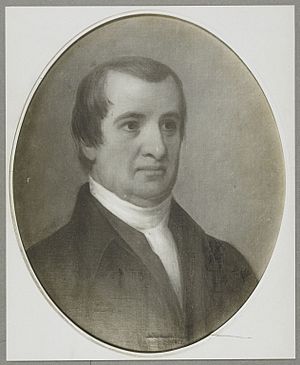Abraham Clark facts for kids
Quick facts for kids
Abraham Clark
|
|
|---|---|
 |
|
| Member of the U.S. House of Representatives from New Jersey's at-large district |
|
| In office March 4, 1791 – September 15, 1794 |
|
| Preceded by | Lambert Cadwalader |
| Succeeded by | Aaron Kitchell |
| Personal details | |
| Born | February 15, 1726 Elizabethtown, Province of New Jersey, British America |
| Died | September 15, 1794 (aged 68) Rahway, New Jersey, U.S. |
| Resting place | Rahway Cemetery, Rahway, New Jersey |
| Political party | Pro-Administration |
| Signature |  |
Abraham Clark (born February 15, 1726 – died September 15, 1794) was an important person in early American history. He was one of the Founding Fathers and a politician. He played a big part in the American Revolution. Clark represented New Jersey in the Continental Congress. There, he famously signed the Declaration of Independence. Later, he served in the United States House of Representatives until he passed away in 1794.
Contents
Abraham Clark's Early Life
Clark was born in a place called Elizabethtown in the Province of New Jersey. His father, Thomas Clark, noticed that Abraham was very good at math. So, he hired a teacher to teach Abraham how to survey land.
While working as a surveyor, Abraham taught himself about law. He then started his own law practice. He became very well-liked and was known as "the poor man's councilor." This was because he would help poor people who could not pay for a lawyer. He also owned enslaved people.
Around 1749, Clark married Sarah Hatfield. They had ten children together. While Sarah took care of their farm and children, Abraham started his career in politics. He became a clerk for the Provincial Assembly. Later, he was the high sheriff of Essex County. In 1775, he was chosen to be part of the Provincial Congress. He also joined the Committee of Public Safety.
Abraham Clark's Political Journey
In early 1776, the people representing New Jersey in the Continental Congress did not want to break away from Great Britain. But as the idea of independence grew stronger, New Jersey decided to change its representatives. They chose new people who supported independence.
Abraham Clark strongly believed that the colonies should be independent. So, on June 21, 1776, he was chosen as a new delegate. Other new delegates included John Hart, Francis Hopkinson, Richard Stockton, and John Witherspoon. They arrived in Philadelphia on June 28, 1776. In early July, they all voted for the Declaration of Independence.
Clark stayed in the Continental Congress until 1778. After that, he was elected to the New Jersey Legislative Council. New Jersey sent him back to Congress two more times. This was from 1780 to 1783 and again from 1786 to 1788.
Clark was one of New Jersey's three representatives at the Annapolis Convention of 1786. This meeting was held to discuss trade rules. Clark was known for supporting regular people, like farmers and mechanics. He believed these jobs were very important for a good society. He also thought that citizens should speak up and ask their leaders for changes when needed.
In 1786, Clark helped pass a bill in New Jersey. This bill allowed the state to print paper money to help people who owed money. To get support for this idea, Clark wrote a pamphlet. He used the pen name "A Fellow Citizen." In this writing, he talked about how New Jersey could become stronger by improving farming and manufacturing.
Death and Lasting Impact
Clark retired from politics before the state's Constitutional Convention in 1794. He sadly died from sunstroke at his home.
Today, Clark Township in Union County, New Jersey, is named after him. Also, Abraham Clark High School in Roselle, New Jersey, carries his name. Abraham Clark is buried at the Rahway Cemetery in Rahway, New Jersey.
See also
- List of United States Congress members who died in office (1790–1899)
- Memorial to the 56 Signers of the Declaration of Independence
 | Misty Copeland |
 | Raven Wilkinson |
 | Debra Austin |
 | Aesha Ash |

